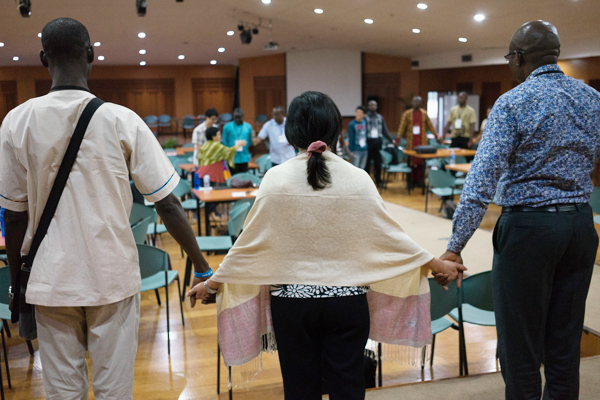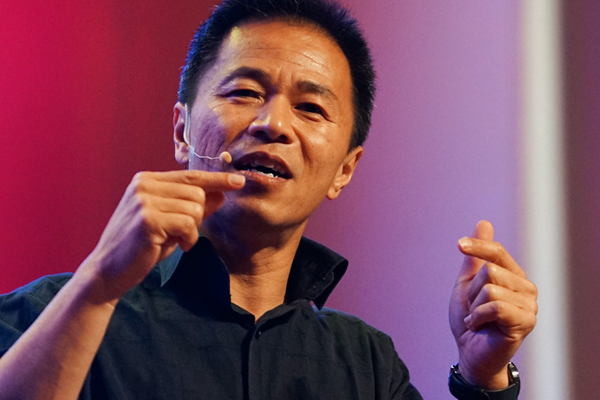‘For Christ’s love compels us, because we are convinced that one died for all, and therefore all died. And he died for all, that those who live should no longer live for themselves but for him who died for them and was raised again. So from now on we regard no one from a worldly point of view.’ 2 Corinthians 5:14-17
The focus of our fourth full day at the 2016 Lausanne Younger Leaders Gathering (YLG) was love—how to remain motivated in love, because of Christ, toward those who persecute us and those yet unreached with the gospel. In his morning talk, Richard Chin spoke on the Transfiguration from Matthew 17. This remarkable incident showed us clearly (or perhaps, brightly!) that Jesus is the real deal; not Moses or Elijah but Jesus. He is the one the prophets spoke about. While Moses encountered glory in his lifetime, Jesus was that glory. Jesus also had God the Father’s approval—‘This is my Son in whom I’m well pleased.’ Richard explained that it is this Jesus who reigns supreme, and we are to tell people everywhere that he is Lord of heaven and earth—from London to Manila to São Paulo.
In 2 Corinthians 4, the Apostle Paul implores believers to set forth the truth plainly when speaking to others about Jesus: ‘What we preach is not ourselves, but Jesus Christ as Lord.’ Richard echoed the Apostle’s words: ‘As we share our stories, remember that Jesus is the hero! If you are the hero of your story, then you are not sharing Jesus.’
So as we share Jesus, how do we stay motivated even when persecution comes and when the fruit is little? How do we renew our passion for the gospel without sacrificing those we are called to love? How do we engage those around us, whether refugees, young children, or those of other faiths? We look at the Lord Jesus afresh! He is the big deal and it’s in his strength that we reach out to the nations with his gospel.
I spoke to two brothers earlier in the week who, because of God’s love towards them, have been reaching out to communities in India and Australia.
Shivraj was born and raised in a Hindu family in Chhattisgarh, central India. He belongs to the Dhimar, a people group of about 2 million who are unreached with the gospel. They are a caste of fishermen and according to the Joshua Project, they are 100 percent Hindu. He has a deep desire to reach his people with the gospel. He is a PhD candidate with Asbury Theological Seminary in the United States.
He had a very hard start in life and due to a curse upon the family, lost his mother to witchcraft when he was less than a year old. His father was an alcoholic and these circumstances made for a childhood of struggle and survival. He desperately wanted to live a happy life, filled with riches and fame.
After a period of practising palmistry and numerology (he even became a leader of the Ganesha Festival), he hit a wall facing sickness and depression. It was then that a serious question began to haunt him: ‘What would be the use of a lot of money and fame if one day I had to die?’ Following a three-day journey to see one of his uncles, a series of prayers, conversations, and a miraculous encounter with Jesus, he surrendered his life to the Lord on Easter Sunday. He immediately experienced the cost of following Jesus.
During the following years and in often difficult circumstances, he developed his gifts in translation, writing, preaching, and teaching. He also wrote a tract called ‘Good News for Fishermen’ and has been reaching out to people in his state on a one-to-one level. But he wants to do more: ‘I want to pioneer a movement that will reach my people with the gospel. There isn’t even one church or missional organisation which is working among them. One person can’t do it all by themselves. Since I started reaching out, the fruit has been very small. I have a dream to participate in God’s mission to these people.’ He added: ‘I’m struggling to shape the plan and somebody needs to help me. American friends sometimes ask me about strategy and the plan. But we have to discover the plan together.’

Shivraj’s prayer is that the YLG2016 will provide him with encouragement and divine connections which will lead to a concerted effort to reaching the Dhimar people: ‘I’m hoping that as I connect with friends here, I’ll get support, prayer, and guidance. That’s my dream.’
Another YLG2016 participant Ryan Vallee is engaged in reaching communities in and around Brisbane, Australia, with the gospel. Ryan moved to the country from Canada in 2010 to join the senior leadership team of Kenmore Baptist Church. In his role, he has been involved in various aspects of church life, mainly on developing care and outreach systems which seek to serve the communities around them.
A ‘Street Team’ ministry team goes out twice a month for two hours to offer practical care to those in need as well as give them opportunities to hear the gospel. ‘The team goes where people have sent us. We’ve gone to about 700 houses now, and it is spreading to other churches. We focus on people who are struggling. We do gardening and interior cleaning. One person—usually the person known by those being served—chats and deepens the one-to-one relationships. New Christians are particularly invited to get involved because we use the ministry as a means of discipleship.’
Being engaged in the communities around them including the Aboriginal shires is on the church’s heart, particularly in Cherbourg and Murgon: ‘No white people live in Cherbourg and some people say it’s not safe. I don’t think that’s entirely true. It is three hours west of Brisbane. We are also involved in Murgon which is a mixed community of whites and Aboriginals, only a five-minute drive away.’
The Aboriginals are a small minority in Australia. They have been severely abused in the past. Children were taken away, even in the last 100 years, and a lot of pain has been caused. ‘Right now, they find it very hard to trust outsiders,’ Ryan explained. ‘White people have to be invited into Aboriginal communities and to stay for the long-term.’ Some problems that affect these communities typically include alcoholism, abuse, violence, addiction, unemployment, poor health, and low life expectancy.
The church has helped establish local partnerships with local chaplains. It’s a programme that is working well. Local churches are increasingly working together, and they have seen people come to Jesus in the process—praise God! There are outreaches and a partnership has also been established with a radio station. Ryan explains: ‘One of the things first-nation people really appreciate is story. Narrative theology is an access point for them. They speak of ‘dream time’ which talks about their origins. Aboriginal art is very distinctive. They use art to communicate and tell stories. Also, sacred spaces for them are important. Many tourists will walk up Ayers Rock, Uluru, but for them, that’s an insult. When Dave Benson and I were there, we chose not to walk up the rock to not insult the local communities.’
Praise God for the gospel work that has taken place among Aboriginal communities over the last 100 years. Ryan said, ‘There’s a growing recognition that life flourishes when Christ reigns in these communities.’

